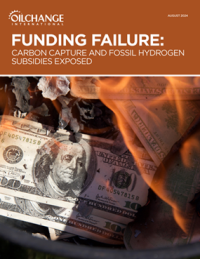Funding Failure: Carbon Capture and Fossil Hydrogen Subsidies Exposed

Despite 50 years of development and an estimated USD 83 billion in investments since the 1990s, carbon capture has failed to make a dent in carbon emissions. Carbon capture projects consistently fail, overspend, or underperform. In the United States, where most carbon capture projects operate with the help of major federal subsidies, 80% of projects fail due to technical issues, over expenditure, and a lack of financial investment returns. Even if carbon capture functioned as planned, the projects currently operating globally would only capture 0.1% of global emissions. However, many of these projects not only consistently operate below capacity but are predominantly used to boost oil and gas production through enhanced oil recovery (EOR).
This briefing draws from a unique global database compiled by Oil Change International that tracks government awards distributed to companies from 1984 to 2024 for carbon capture and fossil-based hydrogen research, development, and pilot and commercial projects. OCI has also compiled a policy tracker of existing policies that support both carbon capture and hydrogen with financial incentives. The policy tracker may not be an exhaustive list given the opacity of some governments’ policies.
Far from helping to decarbonize the world, these subsidies will prolong fossil fuel extraction and enhance the industry’s profits, setting back progress made in recent years to eliminate public finance for a sector that is both highly profitable and primarily responsible for the climate crisis we are in. (Extract from the document's introduction).

